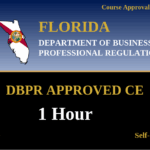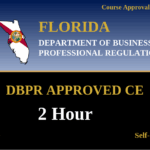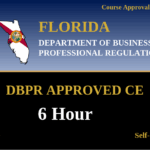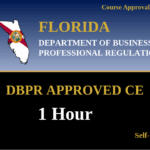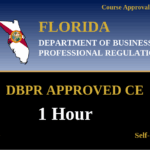
Online Electrical Continuing Education for Florida and Texas License Renewal
Florida Electrical License Renewal: A Two-Year Cycle with Specifics
Florida’s electrical licensing is managed by the Electrical Contractors’ Licensing Board (ECLB), under the Department of Business and Professional Regulation (DBPR). The state operates on a two-year renewal cycle, with all electrical licenses expiring on August 31st of every even-numbered year. Unlike the local-level journeyman licenses, the state-mandated CE requirements apply to state-certified and registered contractors.
Who Needs State-Level CE in Florida?
The ECLB’s continuing education requirements are directed at Certified Electrical Contractors (EC) and Registered Electrical Contractors (ER). A certified license allows you to work anywhere in the state, while a registered license is tied to specific local jurisdictions. If you hold a Journeyman Electrician license, your renewal requirements are set by your local county or municipality, and you must verify those rules directly with that authority. For state-licensed contractors, learning how to become an electrical contractor in Florida is just the first step; maintaining that license through proper CE is an ongoing commitment.
Florida’s 11-Hour CE Breakdown
According to the Florida Administrative Code, both Certified and Registered Electrical Contractors must complete 11 hours of board-approved ECLB continuing education every two years to renew their license. These hours are not arbitrary; they are divided into specific categories to ensure a well-rounded professional update:
- 7 Hours – Technical Subjects: This portion must include at least one hour covering a Florida Building Code advanced module. The remaining hours can cover technical topics like an National Electrical Code (NEC) update, which is crucial for staying current.
- 1 Hour – Workplace Safety: This often includes standards from OSHA and best practices for job site safety.
- 1 Hour – Workers’ Compensation: A review of state laws and rules regarding workers’ compensation.
- 1 Hour – Business Practices: This course can cover topics valuable for any electrical contractor looking to improve their operations.
- 1 Hour – Florida Laws and Rules: An update on the specific state statutes and administrative rules governing the electrical industry.
For contractors who are also engaged in alarm system installation, there is an additional requirement of two hours in false alarm prevention, which counts toward the technical subject hours. Finding a provider that offers all these courses in a single package can streamline your renewal. This targeted approach ensures that electricians are up-to-date not just on wiring, but on the full scope of running a safe and compliant business in the state.
Texas Electrical License Renewal: A Straightforward Annual Requirement
In contrast to Florida’s model, the Texas Department of Licensing and Regulation (TDLR) has established a more uniform and frequent renewal process. For nearly every type of individual electrical license in Texas, the rule is simple: renew every year and complete your CE before the expiration date.
Who Needs CE in Texas? A Broad and Consistent Rule
The TDLR mandates CE for a wide range of license holders. According to the TDLR’s official guidelines, the requirement applies equally to a Master Electrician, Journeyman Electrician, and Residential Wireman, as well as Maintenance Electricians, Sign Electricians, and even Apprentices. The consistency is a key feature of the Texas system—if you hold an individual license, you need the same number of CE hours. It’s important to note that while an Electrical Contractor business license must be renewed, it does not have a separate CE requirement; however, the Master Electrician qualifying the business must meet their individual CE requirements.
The Texas 4-Hour Annual Mandate
All Texas electricians needing to renew must complete 4 hours of continuing education annually from a TDLR approved provider. This yearly requirement ensures that electricians are consistently refreshed on critical safety and code information. The topics for this 4-hour block are prescribed by the TDLR and must cover:
- The National Electrical Code (NEC)
- Texas electrical laws and rules (Occupations Code Chapter 1305 and Administrative Rules Chapter 73)
- Electrical Safety, as defined by NFPA 70E training
This streamlined approach makes it easy for electricians to plan their education each year. A complete guide to renewing your Texas electrical license can simplify the process even further. When searching for an electrician school or training provider, ensuring they are approved by the TDLR is the most important step.
The Power of Online Electrical Continuing Education
In today’s fast-paced world, taking time off for in-person classes can be a major disruption. This is where online electrical continuing education becomes a game-changer. Platforms offering online electrical courses provide the flexibility to complete your required hours on your own schedule—whether that’s after a long day on the job site or on a weekend. These courses are designed for busy professionals, allowing you to meet state requirements without sacrificing billable hours.
Moreover, top-tier providers ensure their course content, whether for a Journeyman electrician CE or Master electrician CE, is current and relevant. They incorporate the latest NEC update and provide critical safety training like the Electrical safety course based on NFPA 70E. For those seeking nationally recognized credentials, some platforms also offer training aligned with NCCER standards. This focus on quality and convenience makes online electrical CE the preferred choice for modern electricians.
Beyond Compliance: Using CE for Career Growth
While continuing education is a regulatory requirement, smart electricians view it as a professional advantage. Courses on business practices for electrical contractors can provide invaluable insights into bidding, project management, and financial planning, helping you grow your company. Staying ahead of code changes and workplace safety for electricians not only protects you and your crew but also builds trust with clients and inspectors.
Keeping track of your completed courses is easy, but it’s also wise to occasionally use the state’s electrical license lookup tool to confirm your status is active and in good standing, especially after a renewal period. By embracing CE as a tool for improvement, you ensure your skills remain sharp and your business stays competitive.
Related Resources
Whether you’re renewing in the Sunshine State or the Lone Star State, staying compliant is non-negotiable. ExpertCE offers state-approved, self-paced online courses designed to make your Florida and Texas license renewals simple and efficient. Ready to get started? Browse our courses today and complete your requirements with confidence.
Florida Continuing Education Courses
Explore our board-approved continuing education courses for Florida professionals:
View CE RequirementsFlorida 1 hour course on workers’ compensation
Florida 1 hour course on workplace safety
Florida 2 hours course on false alarm prevention
Florida 6 hours electrical CE course (Technical)
Florida 1 hour business practices course
Florida 1 hour course on electrical laws and rules
Disclaimer: The information provided in this educational content has been prepared with care to reflect current regulatory requirements for continuing education. However, licensing rules and regulations can vary by state and are subject to change. While we strive for accuracy, ExpertCE cannot guarantee that all details are complete or up to date at the time of reading. For the most current and authoritative information, always refer directly to your state’s official licensing board or regulatory agency.


